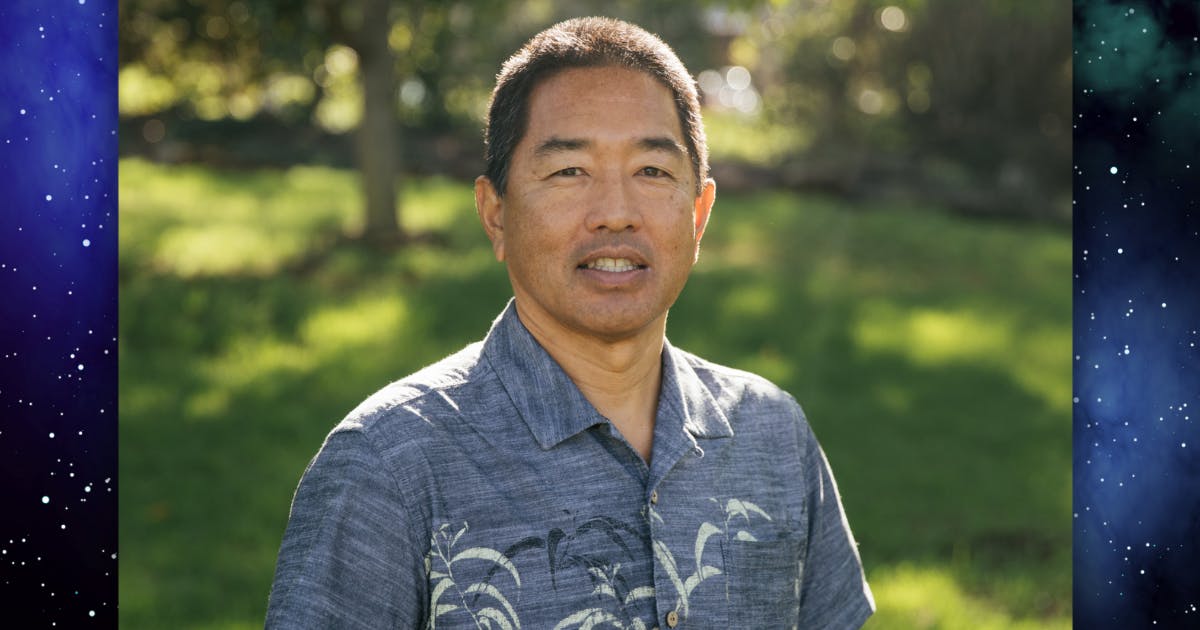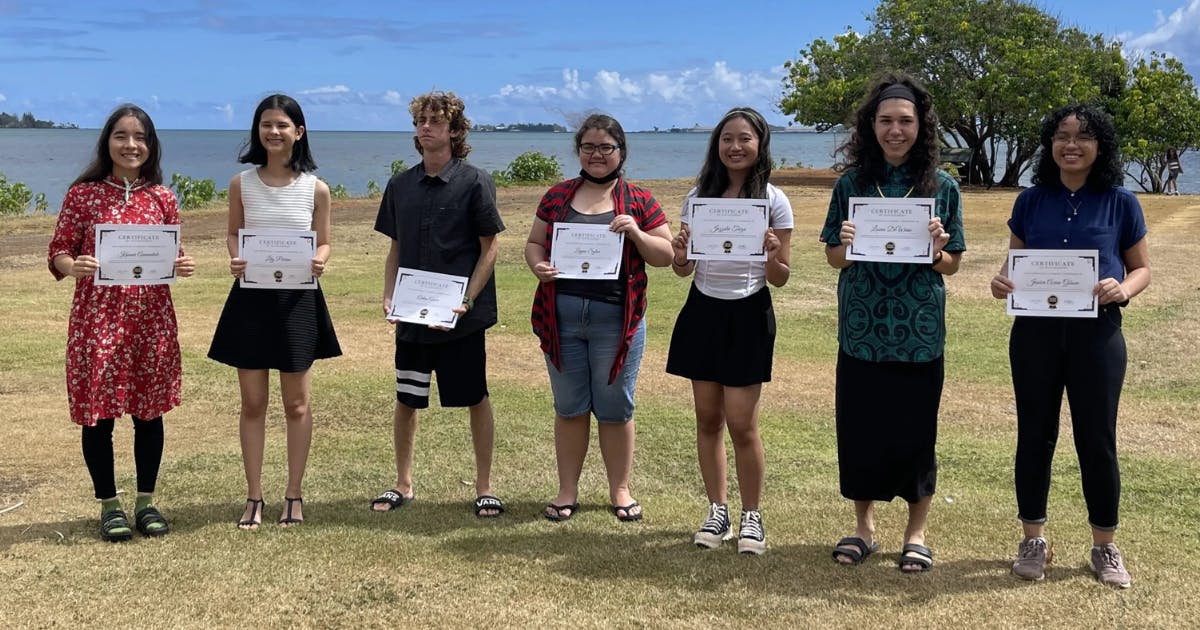
Rich Matsuda is the Director of W. M. Keck Observatory.
As the youngest of six children growing up in Nu‘uanu, Rich Matsuda was born into a position of being a listener. He believes that’s one of the things that influences the way he approaches leadership today.
“Imagine me sitting at the dinner table with all my siblings talking about all the things that interest them. I wasn’t the first one to say what I thought. I was the last one to chime in.”
When it came to bringing up difficult topics or disagreements he learned to do it in a respectful way. “You can’t just pound your fist on the table,” he jokes. “It doesn’t work like that when you’re the youngest kid.”
Being a lifelong listener has served Rich well in his career. He began as an engineer—following in his dad’s footsteps—for a multinational aerospace company before joining the team at W. M. Keck Observatory on Maunakea as an electronics engineer in 1993. Thirty years and several positions at Keck later, he’s currently the observatory’s director, a position he’s held since the beginning of 2024 after serving as interim director for six months in 2023.
“If you asked me a year ago, I wouldn’t have dreamed that I would be in this seat,” he says. “But I’m super grateful to be experiencing what I’m experiencing, as difficult as it is.”
One of the biggest challenges Rich is facing isn’t unique to him or Keck Observatory. It’s something that the entire science community has been grappling with: how to conduct science in the most ethical, equitable, and inclusive ways in the communities they work in.
“I think our history has shown that we have not done that as well as we should have,” he admits. “That’s the opportunity I have in my leadership role at Keck Observatory: to work along others in astronomy and with community to figure out better, more pono ways of doing this. It is really important.”
When the TMT protests and demonstrations began in 2014, Rich was a senior manager of operations. Seeing the uprise from the community ignited a spark within himself.
“Up until that time, the way I saw my value to the organization was through technical and management abilities” he says. “Suddenly, I realized that I had kuleana as a person born and raised here. That part of me became useful to the situation.” He decided then that he would step up and listen to others in the community. “I didn’t see anyone in the organization reaching out beyond our walls to try and figure out what was going on.”
These circumstances compelled him to merge what he calls “professional Rich,” the one with extensive technical management expertise, and “outside of work Rich,” the one with a deep love for Hawai‘i, together for the first time, allowing him to engage with his work and his community in more meaningful and fulfilling ways.
“When I combine these, I feel like both my feet are planted on the ground.”
"I look out my office window in Waimea and think about how we are making efforts to uplift the community while standing shoulder to shoulder to shoulder with them.”
When Rich was about 11, his engineer dad Fujio Matsuda became president of the University of Hawai‘i (UH), serving in the role from 1974–1984. “That was a time at which astronomy was being developed and led by the university on Maunakea,” Rich says.
Before Fujio passed away in 2020, Rich, then the chief of operations for the observatory, and his dad would talk a lot about “the promise of astronomy, and yet, the disheartening way in which it had become a point of division and contention in the community.”
Fast forward to today, and in addition to his role at the Keck Observatory, Rich is also the representative for astronomy on the Maunakea Stewardship and Oversight Authority, created in 2022 as a response to the TMT protests.
“We are undergoing a shift of kuleana for the stewardship of Maunakea from the University of Hawai‘i to this new community-based authority. And part of the rationale for the shift is criticism of the university,” he explains, “so to be part of or even seen as a champion of that shift brings up very mixed feelings for me.”
He listens to this inner conflict and uses it as motivation. “I think that’s where the power is: in feeling pulled in all directions,” he notes. “The energy for enacting change comes from feeling conflicted. To create something new, you’ve got to be able to see the different sides.”
Even so, Rich was able to find reassurance in the words of his dad, found after he passed in the form of his inauguration speech for UH.
“He cautioned that research at the university should not be done just for the sake of research alone, but must done in service of humanity,” Rich says. “I took comfort in that, and I feel the work I’m trying to do is about improving the human situation.”
“We’re all in it together. We��’re interdependent. And for the system to thrive, we’ve all got to thrive.”
Rich has been a part of Keck Observatory since shortly after the first telescope was completed in 1992, so he’s been able to see the organization evolve and change over decades.
“In 2023, Keck celebrated 30 years of doing science on Maunakea,” adding that combined with the other telescopes, “Maunakea is the best location in the world for uncovering new knowledge about the universe.”
These discoveries have impacts far beyond the realm of astronomy. “I think we can get lost in the highly technical, scientific jargon at times,” he says, “but if you zoom out, what it really boils down to are deeply human questions.” Or to put it in terms his father used in those articles and speeches, at the center of these questions is humanity.
“How did the universe begin? How did it evolve over time? What is our place in this universe? Are we unique? Are we alone?... And so that gives you a different perspective on life, and sort of a ‘cosmic humility’ about that.” He continues, “Yet, what we have here on Earth is so precious. What we have here is really special and to be cared for.”
While he believes all of Hawai‘i can be proud of the world-class science taking place on Maunakea, he acknowledges that the current situation of how decisions are made about land use is contentious. “Especially with places that are sacred to the indigenous people, the Native Hawaiians,” he elaborates.
“I think there is great progress happening. We’re working really hard, and I’m proud of that.” he says. “At the same time, I want to express with all humility that we have a long way to go.”
“I look out my office window in Waimea and think about how we are making efforts to uplift the community while standing shoulder to shoulder to shoulder with them,” he continues. “Not in a transactional way like we’re giving you something and therefore you should support us. But more local style, like the end of a party when people start folding up the chairs and the tables. Nobody needs to ask. You just jump in, and even if I don’t know you and I’m at your house, I’m going to jump up and help.”
One way the observatory has helped build community relationships is by implementing a “2% Community Engagement Policy.” Keck team members are encouraged to give 2% of their paid work time—about a week’s worth of time during the year—to volunteer for community service efforts. Many of these opportunities are employee driven.
They’re also creating more pathways for people in the community to work at the observatory.
“About 30% of our staff is kamaʻāina,” which he reports is better than it has ever been. His long-term goal is to get that to 50%, reflecting the makeup of the community. “To have more kamaʻāina leadership in astronomy would be a great thing, and there are a lot of emerging leaders that are rising through the ranks.”
Taking a note from his own experiences, Rich, along with a colleague Leslie Kissner developed and launched the “Kamaʻāina Connections Program,” a leadership development program for Maunakea Observatories employees who, like him, have experienced internal conflicts with their work and their identity.
“When there’s a huge chasm with the community, being able to see both sides of that is really important,” he explains. “These kamaʻāina have multi-generational networks of family and friends, and they’re already hearing it from those who are pro-astronomy as well as anti-TMT… Our program participants are the people who can help bridge and find common ground, acknowledge the hurt and pain, and try to change their organizations to be more pono.”
He remembers sharing with a group of participants of how he only saw his value in his professional skill sets before realizing the wisdom and values that came from being raised in Hawai‘i gave him an advantage in building bridges.
“All of them felt the same way,” he reveals, “and so I told them, ‘You have to put those things together and you can really help yourself feel better, help your organization thrive, and help your community.’”
"To have more kamaʻāina leadership in astronomy would be a great thing, and there are a lot of emerging leaders that are rising through the ranks."
To date, three cohorts and a combined 23 people have gone through the program. “It’s been really rewarding to see folks realize that they can be their full selves at work. That’s what we need right now.”
Rich says his guiding star in all of his roles regarding Maunakea is acting in mutual stewardship.
“We’re all in it together. We’re interdependent. And for the system to thrive, we’ve all got to thrive,” he explains. “Divide and conquer does not work, especially in a place like Hawai‘i.”
He believes that the work being done in Hawai‘i through the stewardship of Maunakea and how Keck is re-envisioning their relationship to community can serve as a model to inform other scientific fields across the world, as well as to help address other complex issues in Hawai‘i.
“It’s important, yet very difficult work. It would be amazing if the mauna ended up teaching us how to be better human beings and how to work better together.”
Learn more about the W. M. Keck Observatory at www.keckobservatory.org.
Omidyar Fellow Alex Harris writes about helping students grow their professional networks in ways that are respectful and authentic to our local culture.
